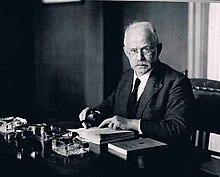Jan Vesters
Joannes "Jan" Baptista Vesters (born July 30, 1869 in Geertruidenberg , † September 25, 1952 in Utrecht ) was a Dutch journalist and author . From 1920 to 1941 he was the first editor-in-chief of the daily newspaper de Volkskrant .
Life
Jan Vesters was the oldest of seven children of journalist Joannes Antonius Vesters. He froze to death at the age of 36 on the way home from a reportage trip to a dike breach in a snow storm, Vesters was 12 years old at the time. After working for a year as an assistant teacher in Cromvoirt, in 1889, like his father, he became a journalist at De Katholieke Illustratie and the likewise Catholic weekly newspaper Het Huisgezin , both of which were produced by the same editorial team. In 1898 he finally became editor-in-chief, and from 1905 Het Huisgezin appeared as a daily newspaper. In De Katholieke Illustratie he published three historical novels with a social impact in the years 1912-17. In January 1920, Vesters also took over the chief editor of de Volkskrant , which had been founded in October of the previous year by some Catholic trade union groups as an organ of the Catholic labor movement. When he took office, this was initially changed to a bi-daily (Mon, Wed, Fri) publication and finally converted into a daily newspaper in October 1921. Vesters held this dual function until 1934, from then on he concentrated on de Volkskrant .
In July 1941, when he was already 72, Vesters was relieved of his position during the German occupation in World War II , as the occupiers wanted to enthrone an editor-in-chief from the ranks of the Dutch National Socialists NSB . The rest of the editorial team then quit of their own accord, and the newspaper was finally discontinued in October of the same year. During the re-establishment of de Volkskrant , which was largely initiated during the war by the entrepreneur and publisher JHE Asberg, the former Minister for Social Affairs Carl Romme and the union leader Adrianus Cornelis de Bruijn , a reinstatement of Vesters was not considered; instead, the decision was made in favor of the relative young Joop Lücker .
The Volkskrant of the post-war years had already reached a multiple of the old edition after a year. Vesters did not experience the separation of the paper from Catholicism in the 1960s and the subsequent turn to the political left, with the simultaneous rise to the second largest quality newspaper in the Netherlands.
Despite the considerably higher editions since de Volkskrant was re-established, Vesters' influence was not insignificant. In addition to his long-standing function as editor-in-chief, he was also chairman of the Roman Catholic Association of Journalists for 28 years. The director of the daily De Maasbode (now defunct, but previously important) , Henri Kuijpers, is credited with saying that Vesters was the most cited journalist in the Netherlands.
The Vesters, journalists across generations
Both of Vesters' sons also pursued journalistic careers, which, however, were associated with less power and prominence. One of them, Jan Vesters Jr (1908–1980), had already succeeded his father to de Volkskrant in 1927 and was later part of the newly formed post-war editorial team. The international department helped shape this and was head of the night-time editing department for some time. However, he could not cope with the editorial change of course that was initiated in the 1960s, and his word was no longer as valid as it was in the pre-war era, when he was still considered No. 2 in the editorial team. In 1968 he retired prematurely after 37 years on the editorial board, which he could no longer actively exercise due to a long illness. The other, Harry Vesters, was responsible for the sports section at the Amsterdam daily De Nieuwe Dag .
Vester's brother Henri was a journalist at Het Huisgezin for 40 years .
Works
- De koning van het goud , 1912
- De idioot , 1913
- Gorm de Noorman , 1917
swell
- Joan Hemels: De emancipatie van een dagblad. Geschiedenis van de Volkskrant. Ambo, Baarn 1981. ISBN 90-263-0537-0
- Frank de Vree: De metamorfose van een dagblad. A journalistieke is divorced from the Volkskrant. Meulenhoff, Amsterdam 1996. ISBN 90-290-5379-8
- Martin Sommer: Krantebeest - JM Lücker. Triomf en tragiek van een courantier. Uitgeverij Balans, Amsterdam 1993. ISBN 90-5018-214-3
Web links
- Biography (dutch)
| personal data | |
|---|---|
| SURNAME | Vesters, Jan |
| ALTERNATIVE NAMES | Vesters, Joannes Baptista |
| BRIEF DESCRIPTION | Dutch journalist and editor-in-chief |
| DATE OF BIRTH | July 30, 1869 |
| PLACE OF BIRTH | Geertruidenberg , Netherlands |
| DATE OF DEATH | September 25, 1952 |
| Place of death | Utrecht , Netherlands |
